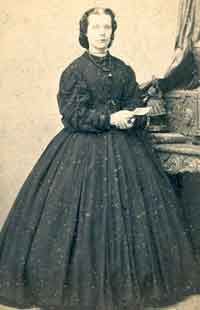
Victorian housekeeper c.1890
Emma Dunlop was employed as a housekeeper at 60 Cleveland Square in Paddington when she noticed a man descend the steps from the street and started inspecting the row of flower pots outside her windows. Opening the door Emma demanded to know what he wanted.
The man told her he ‘wished to see Mrs Davies’. There being no ‘Mrs Davies’ at that address he left. Emma, curious as to what he was up to, came out and poked around the flowerpots herself. She soon saw that one of the pots had been disturbed and digging below the surface she found some coins buried there.
In total there were 24s (around £50 today) and not surprisingly a few minutes later the man was back to retrieve it. However in the meantime Emma had removed the cash and so he was forced to knock at the door and ask her if she had found anything. Emma told him she had and he demanded she hand it over or he would call a policeman.
Fortunately a policeman was passing by at just that moment so Emma called him down and the three went into the kitchen. This is where it all started to go wrong for the man as PC Double (322X) suspected foul play. He arrested the man on suspicion of stealing the money and hiding it so it could not be discovered on him and made some local enquiries. He soon found out that the cook at number 55 Cleveland Square had reported that 24s and 6d were missing from the pantry.
The man was named as James Burton (aged 31 and a painter from Lisson Grove) and when the case was taken to the Marylebone Police Court the magistrate was told that Burton had been working in the kitchen that day. Burton was remanded in custody so the police could pursue their enquiries, his ‘cunning’ attempt to hide the proceeds of his theft and then bully Ms Dunlop into handing it over backfired. He doesn’t make it into the Old Bailey records so I suspect he eventually elected to be dealt with summarily and ended up with a short prison sentence, But maybe the police decided there was insufficient evidence to prove he had taken the money and he got away with it. As is often the case, it is unlikely we will ever know.
[from Reynolds’s Newspaper, Sunday, September 14, 1879]
Advertisements Share this:




